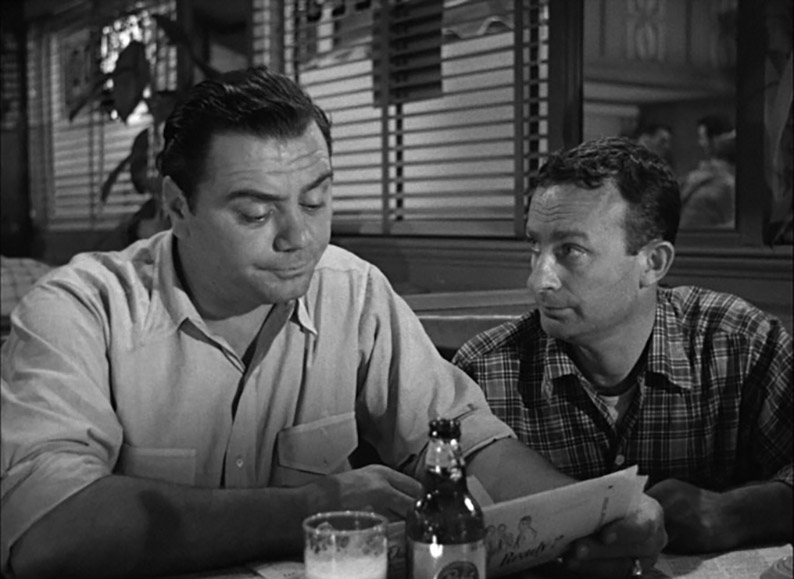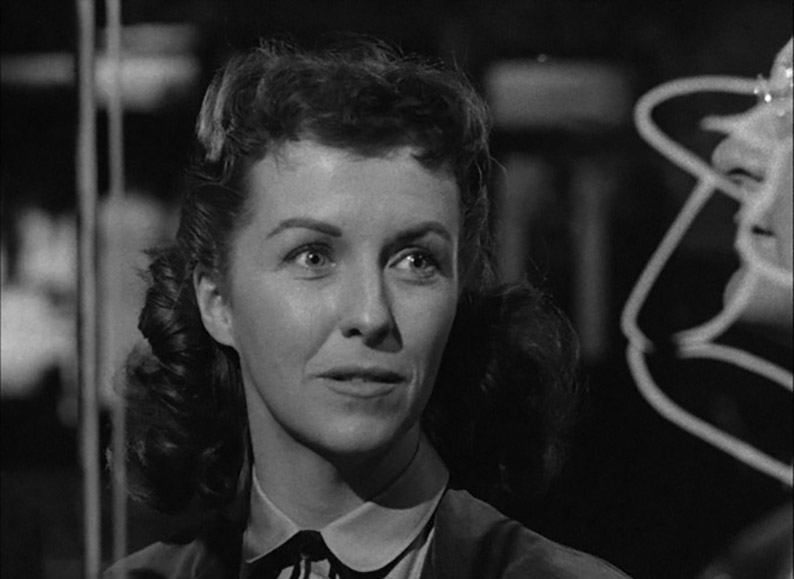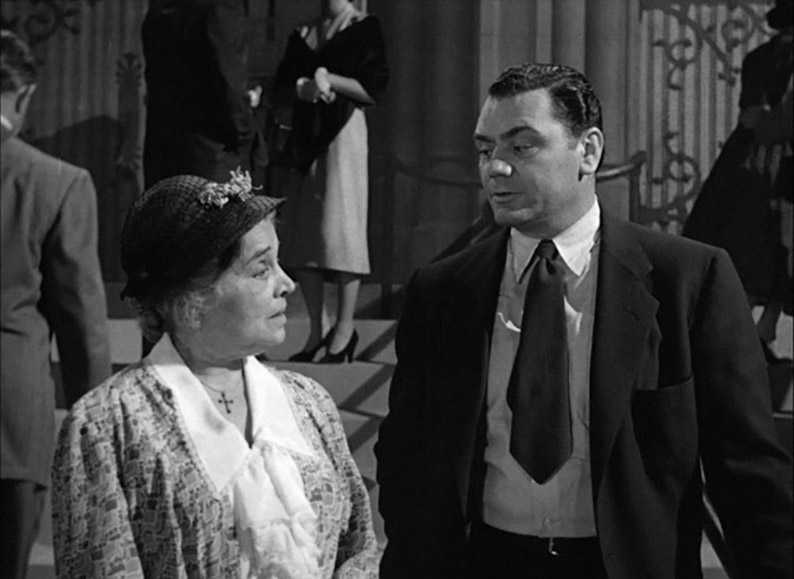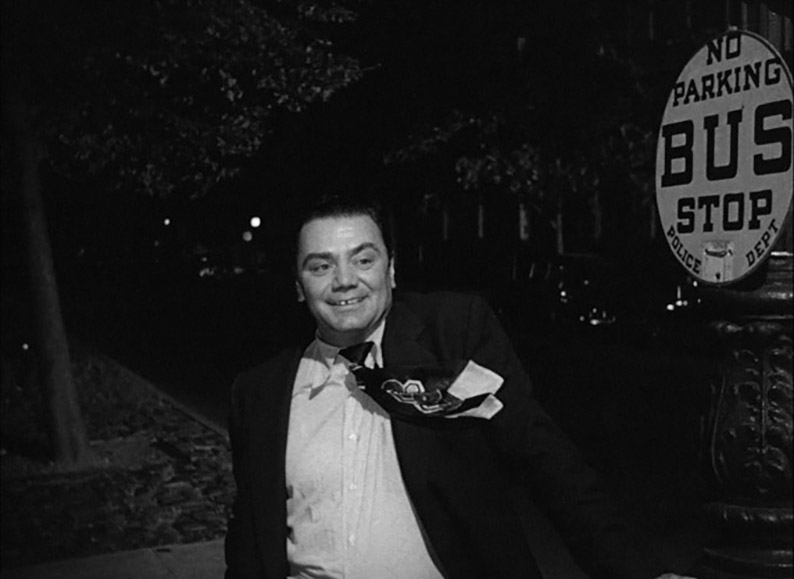| |
'That was me. I was Marty. Believe me, when they went to cast the picture, Bob Aldrich, who had read the script. They said to him, "Who on earth should play the part?" They couldn’t get Rod Steiger, who had played that part on TV because he was doing Oklahoma!. He said, "I know of only one fellow: Ernie Borgnine." "Ernie Borgnine? He’s a killer for God’s sake. What’s the matter with you?"' |
| |
Actor and lead, Ernest Borgnine* |
Borgnine, a classy, talented and much loved character actor who specialised in tough guy parts, got a chance to play both sympathetic and the lead in a tax write-off effort that - almost by accident - made cinematic history. Marty walked off with Best Film at the Oscars and in the same year, the Palme D'Or at Cannes, the second of two films ever to have managed such a feat. The first, for information's sake was the Billy Wilder classic Lost Weekend. Marty is such a sweet film, it's hard in 2018 to believe that people ever behaved in that way and yet, all the frailties and insecurities are in place, all the hapless human floundering and without Google and the world's wisdom at the swipe of a finger, people had to make their own way based on some very questionable wisdom and appalling prejudice from their elders. Marty is the story of thirty hours or so in the life of a humble Bronx butcher. It looks into a short window in the life of an insecure youngish man laid low by constant rejection who finds a woman he can talk to (after she is left in the lurch at a dance) and despite maternal and peer pressure to find someone else to marry, he… now, that really would be telling. Needless to say, do not indulge in any extras until you've seen the film. We're not talking "He was dead all along" or "They weren't really dead at the end," type shocks here but like most stories, they are better received as surprises not confirmations. And its 90-minute running time zips by in a flash.

If Hollywood had ever developed a kitchen sink movement (named after the UK's socio-realist cycle of dramas in the 50s and 60s), Marty would be its Room at the Top with Marty himself less of an angry young man and more of a resigned, unambitious one but still psychologically imprisoned. Class is not often thrust into public debate in the United States but in many ways, money and the gulf between those who have more of it than they will ever need and those who scrape a living is as relevant to Marty as it was to Joe Lampton in Jack Clayton's superior social drama. OK, the only castles in North America have 'Welcome to Hogwarts' written on them, but the class system exists there, one with as many nuances throughout the strata of race, religion and bank balance as in the dear old, polarised UK. Marty is a thoroughly decent man of 34 who lives with his mother and wants nothing more than a woman he can love and a life of happiness. He lives for the weekends when he and his friends continually ask each other "What do you feel like doing?" when all any of them want is a woman in all ways a young man might desire such a partner. But stuck in the male milieu of peer pressure and machismo, Marty (despite his stout build) is more sensitive than a paper-cut and swift to self-deprecate. Like my father (much to my frustration), Marty knows his place. He knows where he stands and what goals are realistic and what goals are not. He has given up on romance…
But no one told Clara.
In the mid-fifties, Hollywood was in a little bit of trouble from an upstart called television. It fought back with Technicolor spectaculars, movies that defied the small screen. It occurred to very few in the power towers that a lot of 'ordinary' people would warm to the story of a simple man seeking romance in desperately prosaic circumstances. Ordinary people did not belong on the cinema screen! And if someone like Borgnine is in the frame, he must be a vicious thug or a venal con artist. He's neither - just an ordinary Joe wanting what ordinary Joes want. The movie has great simplicity to it relying on Borgnine's innate charm and the scene on his way home when he thinks he's cracked that thing called romance is happiness to a degree I've not seen on screen for quite a while. And from a gruff rogue like Borgnine, it's doubly satisfying. Love's not a visitor that stays too long but when that absurdly joyous bug bites, emotionally there's nothing quite like it. But Marty has many obstacles not least his own mother who is desperate for her oldest son to marry an Italian girl. I wonder how that absurd prejudice takes hold, that family members must marry people of their own ethnicity and faith. I guess it's tribalism at its most primal. The mother and her sister are difficult characters to warm to, both seeing the world through their Catholic upbringings. This is so obviously the writer's own experience transferred to the screen and it was quite the surprise to realise just whom the writer was.

Paddy Chayefsky is well respected and his work is hugely enjoyed here at Outsider. His scripts for Network and Altered States elevated him to Hollywood royalty but like all of us, he started humble. His work in Marty is naturalism writ large. There are few 'big' dramatic moments and all the film's events push Marty forward to having a shot at the heart shaped title. We are very far from Network's "I'm as mad as hell and I'm not going to take it anymore!" territory. In fact, my favourite Chayefsky quote is a speech from Altered States. In quoting it, I'm only trying to suggest that Marty is nothing like as knowing or as fiercely iconoclastic as Dr. Jessop and his mission in the Ken Russell film.
"I'm a man in search of his true self. How archetypically American can you get? We're all trying to fulfil ourselves, understand ourselves, get in touch with ourselves, face the reality of ourselves, explore ourselves, expand ourselves. Ever since we dispensed with God we've got nothing but ourselves to explain this meaningless horror of life. That first self is real... and I'm going to find the fucker."
That's the Paddy Chayefsky I know. Not sure that Marty is that self aware… Borgnine actually delivers the following to his prospective girlfriend; "You're not such a dog as you think you are!" I laughed at that line because in no way is the then Mrs. Gene Kelly (Betsy Blair) regarded as anything other than a fine looking woman. Marty is a very interesting movie for the snapshot of the era in which it was made and the innocence of the characters and how that crashes into primal desires and personal heartache. Let's also not forget its extraordinary success and for that alone, it's worth catching up with.
Presented in a crisp, black and white 4:3 aspect ratio, Marty looks good. The original film materials have scrubbed up a treat. There's the occasional sparkle and faint tramlines but all in all, the film looks terrific. There is a series of dark, invading tramlines that barge in from frame right at 1 hour, 17 minutes and 50 seconds but as this is such a surprise, it just proves how clean the rest of the film is.

The Linear PCM mono 1.0 soundtrack is never muffled or unintelligible (which is more than I can say for the teleplay's).
There are new and improved English subtitles for the deaf and hard-of-hearing.
Interview with Film Scholar Neil Sinyard (19' 06")
This has all the information any Marty fan would want to know and it's fascinating that Sinyard compares the 'realist' aspect of the film with the Italian neo-realist genre as exemplified by Vittorio De Sica's Bicycle Thieves. I went with the Brit version but the comparison is valid on both fronts. This extra boasts a simple close up head shot of Sinyard but the information, as always, is relevant, informative and entertaining.
Original Trailer (presented by Burt Lancaster) (2' 58")
It would be extremely interesting to find out when this trailer was actually produced. I cast no aspersions on Burt Lancaster's goals by personally promoting the film but did he know that the scent of Oscar was in the air? The film was originally all but thrown away. Something happened that gave it a new lease of life. I would love to know just what that was. Lancaster tells us he's back in New York (a backdrop so that's hard to believe right off the bat). He praises both Blair and Borgnine to the skies and gives the film a star studded shove forward. Whatever the merits of the trailer, it sure worked.

Marty – original teleplay from 1953 directed by Delbert Mann but starring Rod Steiger
I can't imagine the stress of performing on live TV but in the 50s the one-hour plays were staples of the schedules. Visually it looks like it's been shot through crepe paper and sound wise, it hasn't travelled at all well to the point where I had to turn on the subtitles to help decipher the dialogue. The script is close if not largely identical to the filmed version, which helps understanding the dialogue if you've already seen the filmed version. The direction has a stagey feel to it as most live TV productions unsurprisingly displayed and the focus is very much on stagecraft rather than camera movement. But the acting is top notch and is worth watching for Steiger's interpretation alone.
Archival Interviews with Delbert Mann and the cast of the original teleplay – Rod Steiger, Nancy Marchand and Betsy Palmer (5' 44")
This segment, introduced by Eve Marie Saint, features no date but as Steiger died in 2002 and director Delbert Mann in 2007, it must be a few decades old. It has that NTSC sheen (the oddly hued US TV broadcast system) and it's presented in the 4:3 aspect ratio, which is a common temporal giveaway. There are no front nor end credits which suggests it's part of a longer programme. It's frustratingly short because it's very entertaining seeing how these TV plays impacted those who saw them and just as the stories start, the clip is over. This was an instance of ordinary people watching a drama that could have been a reflection of their own lives, an aspect that probably made the film version so successful. I have to say that Steiger probably would have been as good as Borgnine if the hour TV play (also an Extra) is anything to go by.
Wonderfully performed and simply directed, Marty is a film that defied expectations. It introduced the idea into mainstream Hollywood that people will turn up for a story they could personally relate to or imagine as happening a few blocks down from their street. As sweet as it's simple, Marty packs a lovely and romantic punch.
|